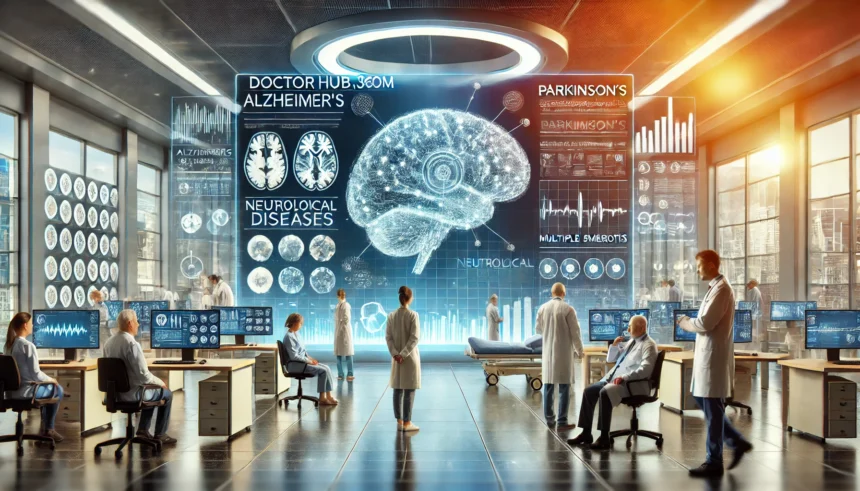Neurological diseases refer to disorders that affect the brain, spinal cord, and peripheral nerves. These conditions can interfere with a person’s motor skills, cognitive abilities, and sensory functions. Since the nervous system controls almost all functions of the body, neurological diseases can significantly impact daily life. According to doctorhub360.com neurological diseases, understanding these conditions is essential for both patients and healthcare providers. This article will explain what neurological diseases are, the different types, their symptoms, how they are diagnosed, and available treatment options.
What Are Neurological Diseases?
Neurological diseases are disorders that affect the nervous system, which includes the brain, spinal cord, and nerves that extend to other parts of the body. The nervous system is responsible for controlling movement, thoughts, and actions. When any part of this system is damaged, it can lead to a range of symptoms, from memory loss to difficulty moving or speaking.
There are two main parts of the nervous system:
- The nervous system’s central nervous system (CNS) involves its cerebral cortex or the vertebral column.
- Peripheral Nervous System (PNS): Nerves outside the brain and spinal cord that connect to organs, muscles, and skin.
Types of Neurological Diseases
Neurological diseases can be broadly classified into the following categories:
1. Central Nervous System Disorders
- Alzheimer’s Disease: A common cause of dementia that leads to memory loss, confusion, and difficulty with daily tasks.
- Parkinson’s Disease: Affects movement, causing symptoms like tremors, rigidity, and slowed movement.
- Multiple Sclerosis (MS): An autoimmune disease that attacks the protective covering of nerve fibers, leading to problems with coordination and vision.
- Epilepsy: A condition where the brain has abnormal electrical activity, leading to seizures.
2. Peripheral Nervous System Disorders
- Peripheral Neuropathy: Damage to the nerves outside the brain and spinal cord, causing symptoms like numbness, tingling, and pain, often in the hands and feet.
- Guillain-Barré Syndrome: A rare condition where the body’s immune system attacks peripheral nerves, leading to muscle weakness and sometimes paralysis.
3. Neurodegenerative Diseases
- Huntington’s Disease: A genetic disorder that causes the progressive breakdown of nerve cells in the brain, leading to movement problems and cognitive decline.
- Amyotrophic Lateral Sclerosis (ALS): Also known as Lou Gehrig’s disease, it causes the progressive degeneration of motor neurons, leading to muscle weakness and loss of motor control.
Symptoms of Neurological Diseases
The symptoms of neurological diseases can vary widely depending on the type of disorder and which part of the nervous system is affected. However, common symptoms include:
- Cognitive Impairment: Memory loss, confusion, and difficulty concentrating.
- Motor Symptoms: Muscle weakness, tremors, rigidity, or difficulty moving.
- Sensory Symptoms: Numbness, tingling, or pain in various parts of the body.
- Seizures that constitute repeated instances involving erroneous electrical reactions within the nervous system.
- Behavior and Mood Changes: Depression, anxiety, and personality changes.
Symptoms may worsen over time or be intermittent, depending on the condition.
How Are Neurological Diseases Diagnosed?
Diagnosing neurological diseases usually involves several steps:
- Neurological Examination: A doctor will test reflexes, muscle strength, balance, and coordination.
- Imaging Techniques: MRI (Magnetic Resonance Imaging) and CT scans are often used to get detailed images of the brain and spinal cord.
- Electroencephalogram (EEG): This test measures the electrical activity of the brain, helping diagnose conditions like epilepsy.
- Neuropsychological Testing: These tests help assess cognitive functions like memory, problem-solving, and attention.
Treatment and Management of Neurological Diseases
While there is no cure for many neurological diseases, treatments can help manage symptoms and improve quality of life:
Medications:
- Parkinson’s Disease: Medications like levodopa help manage movement symptoms.
- Epilepsy: Anticonvulsant drugs control seizures.
- Alzheimer’s Disease: Medications like donepezil may help manage symptoms, but they don’t cure the disease.
Surgical Treatments:
- Deep Brain Stimulation (DBS): A procedure used for Parkinson’s disease where electrodes are implanted in the brain to help control symptoms.
- Brain Surgery: In some cases, surgery may be required to remove tumors or reduce pressure on the brain.
Physical and Occupational Therapy:
- These therapies are essential in helping individuals regain strength and independence. Physical therapy helps improve mobility, while occupational therapy focuses on daily living skills like dressing and eating.
Lifestyle Changes:
- Eating a balanced diet, staying active, and engaging in mentally stimulating activities can help improve symptoms and slow disease progression.
Living with Neurological Diseases
Living with a neurological disease can be challenging, both for patients and their caregivers. As the disease progresses, patients may need help with basic activities like walking, eating, or bathing. Support from family members, friends, and healthcare providers is crucial. There are also many patient advocacy groups and mental health counselors who can help individuals cope with the emotional and psychological challenges of living with a neurological disease.
Preventing Neurological Diseases
While some neurological diseases are genetic and cannot be prevented, lifestyle changes can reduce the risk of others:
- Exercise Regularly: Physical activity improves brain health and reduces the risk of conditions like stroke and dementia.
- Eat a Healthy Diet: A diet rich in fruits, vegetables, and healthy fats supports brain function.
- Avoid Smoking and Excessive Alcohol: Both can increase the risk of stroke and other neurological conditions.
- Manage Chronic Conditions: Controlling conditions like diabetes, high blood pressure, and high cholesterol can prevent complications related to the nervous system.
Conclusion
Neurological diseases affect millions of people worldwide, but early diagnosis and proper treatment can help manage symptoms and improve quality of life. Understanding the types, symptoms, and treatment options for these conditions, as highlighted by doctorhub360.com neurological diseases, is essential for both patients and their families. If you or a loved one is experiencing symptoms related to the nervous system, it’s important to seek medical advice from a healthcare professional for proper diagnosis and management.
Frequently Asked Questions (FAQs)
What are neurological diseases?
Neurological diseases are disorders that affect the brain, spinal cord, and nerves, impacting motor skills, cognition, and sensory functions.
How are neurological diseases diagnosed?
Diagnosis typically involves neurological exams, imaging tests (like MRI), EEGs, and neuropsychological evaluations.
Can neurological diseases be cured?
Many neurological diseases cannot be cured, but treatment options like medications and therapies can help manage symptoms.
What are the common symptoms of neurological diseases?
Symptoms include memory loss, muscle weakness, tremors, seizures, and changes in behavior or mood.
How can I manage neurological diseases effectively?
Early diagnosis, medication, therapy, lifestyle changes, and regular medical care are key to managing neurological diseases effectively.
Recommended Article:
CGI Franklin Uniqua Fries and Tea: The Unexpected Culinary Delight
Pawziel Full Version 2: The Ultimate Pet Care Tool You’ve Been Waiting For
The stephen kostelnya Life and Contributions







